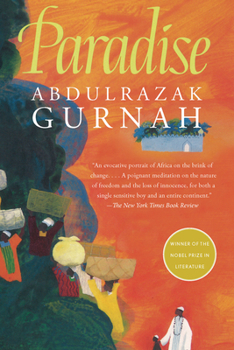Paradise: By the Winner of the Nobel Prize in Literature 2021
Select Format
Select Condition 
Book Overview
Una historia de iniciaci?n que ilumina la crudeza y la belleza de la ?frica precolonial, por el premio Nobel de literatura 2021. Cuando los padres de Yusuf, de doce a?os, le dicen que vivir? con su... This description may be from another edition of this product.
Format:Paperback
Language:English
ISBN:1565841638
ISBN13:9781565841635
Release Date:May 1995
Publisher:New Press
Length:256 Pages
Weight:0.73 lbs.
Dimensions:0.7" x 5.4" x 8.3"
Customer Reviews
3 ratings
Africa on the brink of colonization
Published by Thriftbooks.com User , 20 years ago
Gurnah's second novel, the first to be published in the US, takes place in East Africa at the beginning of the wave of European colonization. At its center is Yusuf, age 12, sold to a rich merchant in payment of his father's debt. Wrenched from his rural home to work in the urban shop of "Uncle" Aziz, Yusuf does not at first realize he has been sold. He finds himself in a place where Indians, Arabs and African Muslims coexist in a complex hierarchy of languages, religions and cultures, united by their common interest in trade. Their exploitation of each other is ruthless but based on traditions of power and debt. But the Europeans, still just a fabled presence, inspire stories of madness, insatiability and invulnerability. While many merchants believe they want to gobble the whole continent (for unfathomable reasons) Aziz calmly proclaims, "They're here for the same reason you and I are." Yusuf, who asks many questions and receives few answers, adapts to town life, only to be abruptly drafted into Aziz' trading journeys to the interior. His first trip exposes him to the dusty hardship of life away from the coast and the comforting sympathy of kind people. His second is a spectacular trek through remote lands filled with warring, hostile peoples, poisonous snakes, treachery, strange diseases and sudden, devastating weather. Through it all Yusuf perseveres, watching and listening, especially fascinated by the nighttime tales of the alien Europeans, who come closer every day. While Yusuf is more a metaphor for Africa's exploitation than an individual, Gurnah's story is breathtaking for the tumultuos color of the life he describes, the vividness of Africa and the rich energy of his prose.
Deceptively simple, beautifully realized.
Published by Thriftbooks.com User , 24 years ago
A finalist in 1994 for both the Booker Prize and the Whitbread Award, Paradise hides major themes and ideas within the seemingly simple story of Yusuf, a twelve-year-old boy in rural East Africa whose father sells him to a trader to settle a debt. East Africa is in turmoil--on the verge of World War I and the fighting which eventually develops between the Germans in Tanzania and the British in Kenya. Cities are growing, populations are moving, merchants are trading and selling, and colonialists from many countries are vying for influence. When Yusuf is sold to his "uncle" Aziz, he leaves his remote rural village in what is now Tanzania and joins a trading caravan, traveling to the highlands and eventually on an ill-fated trading safari to the remote interior, discovering whole new worlds as he goes. In eight years of travel, he "progresses" from the countryside to a coastal city, from simple subsistence to the complexities of urban, mercantile life, and from his childish pleasure with a shiny coin to adult love. As a young child/adolescent, Yusuf is an obvious symbol of Tanzania itself at this early stage in its history. Just as Yusuf must come of age, so also must the country as the various groups contending for influence make choices about how much they will accept, reject, or adapt to outside influences. As Yusuf comes into contact with tribal chieftains, Muslim traders, Indian shopkeepers, and German empire builders, the reader observes the impact of all of these groups both within Yusuf and within the loose, artificial borders of Tanzania. Creating vivid images primarily through his selection of the perfect detail, Gurnah uses simple, poetic language to tell a delightful story loaded with important social and political observations, conveying clearly and objectively the historical background of the country in which the author was born. Dialogue is often filled with humor, and Yusuf becomes a real person, not a cardboard symbol. A novel which begins as a beautifully realized coming-of-age story develops into a story of high adventure, social and political realism, and eventually love. Mary Whipple
A most poetic reconstruction of a lost culture
Published by Thriftbooks.com User , 26 years ago
The author succeeds in conveying a highly poetic vision of Islamic East African Culture, without embellishing it or denying its dark side. A beautiful read. I will certainly read more by this author and search for other Black Africans, moslem or not, who can teach me more about their fascinating culture.
Paradise Mentions in Our Blog

And The Nobel Prize for Literature Goes To . . .
Published by Ashly Moore Sheldon • October 05, 2023
Unlike many literary prizes, the Nobel Prize is based on a body's author of work as a whole, rather than an individual title. This year's Nobel Prize for Literature has been awarded to Norwegian playwright Jon Fosse. Read on to learn about his impact, as well as that of winners from the past seven years.





